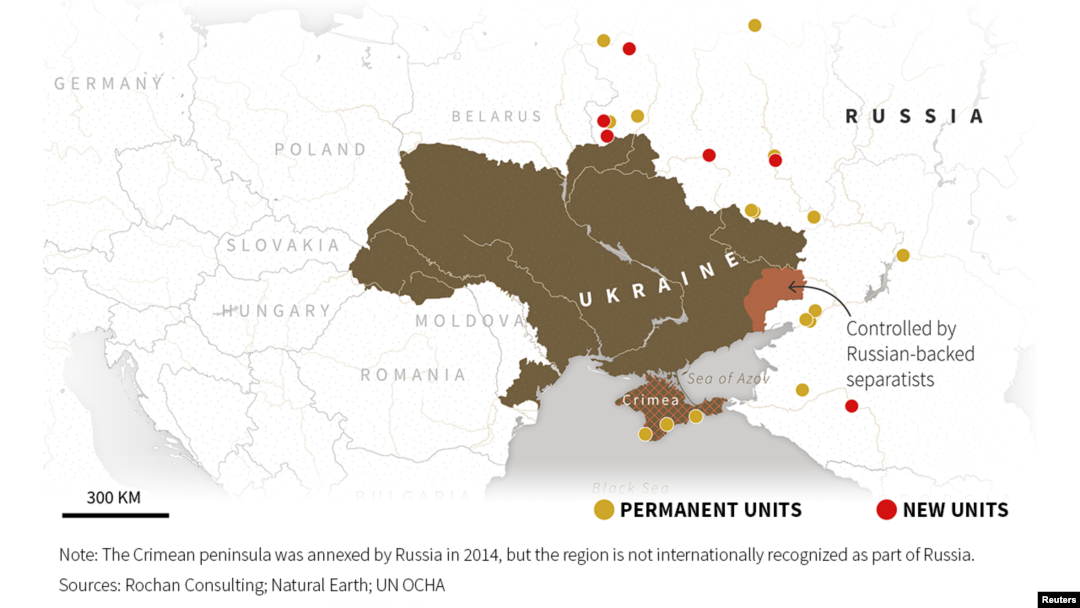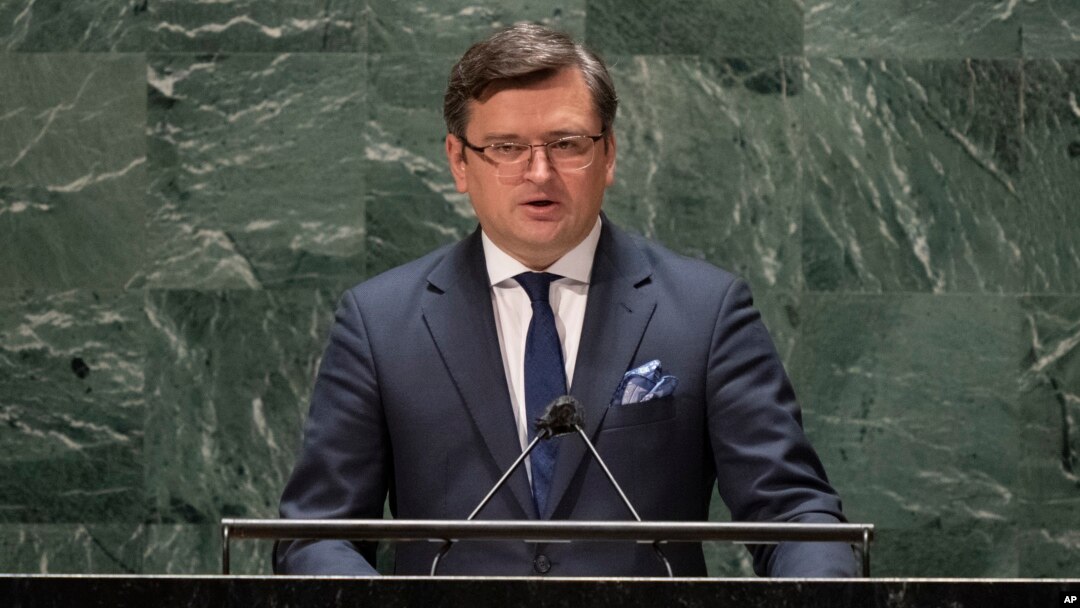Ukraine’s foreign minister appealed to the international community on Wednesday to “take swift, concrete and resolute actions” to help preserve his country from Russian military aggression.
“Russia will not stop at Ukraine,” Ukrainian Foreign Minister Dmytro Kuleba told a meeting of the U.N. General Assembly. He added that a full-scale war against Ukraine would be the end of the world order as we know it.
“Russia shows signs of readiness to further escalate its aggression against Ukraine, and we have limited time to stop, deter and contain it,” he warned. “Every hour of inaction now is a threat to the lives of Ukrainians, not only military but also civilians, including women and children. This is an escalating threat to our collective global security and to our freedom.”
On Monday, Russian President Vladimir Putin, who has amassed 150,000 troops along Ukraine’s border, signed a declaration recognizing the breakaway regions of Donetsk and Luhansk in eastern Ukraine as independent entities. He then ordered Russian troops to the area, saying the purpose was to protect civilians.

Map: Russian troop locations near Ukraine
The move has been widely condemned as a violation of Ukraine’s sovereignty, territorial integrity and political independence, as well as a breach of international law, the U.N. charter, the Helsinki accords, the Budapest Memorandum and the Minsk agreements.
Wednesday’s General Assembly session had been planned in advance to discuss the situation in the Crimean Peninsula in southern Ukraine, which Russia annexed in 2014. No country has recognized that move, and the meeting is known as “Situation in the Temporarily Occupied Territories of Ukraine" on the U.N. agenda. This is the fourth time the assembly has discussed it in eight years.
Your browser doesn’t support HTML5
Eastern Ukrainian City Still Sanguine Despite Looming Russian Threat
Russia’s envoy opened by criticizing the name of the event, saying it would be more accurate to say, “territory lost as result of hate-filled policy against its own citizens.” He then launched an attack on U.N. Secretary-General Antonio Guterres for his criticism of Moscow’s latest land grab.
“It is to our great regret that the U.N. secretary-general, today and few days ago, has made some statements regarding what is going on in the east of Ukraine that are not in line with his status and his mandate under the U.N. charter,” Russian Ambassador Vassily Nebenzia said.
Guterres has strongly criticized Moscow for violating the U.N. charter and causing the most serious global peace and security crisis in recent years.
Nebenzia also criticized Ukraine for not living up to the Minsk agreements – the framework for a political settlement of the eastern Ukraine issue.
“The cornerstone of the [Minsk] package is dialogue, and this has been sabotaged by Ukraine all this time,” Nebenzia claimed.
Condemnation of Russia
Nearly 90 countries were scheduled to speak Wednesday. There was overwhelmingly strong condemnation of Russia’s actions and its threat of force on another sovereign state.
“We urge Russia to withdraw its forces and materiel from within Ukraine, including the Crimean Peninsula and non-government-controlled areas of Luhansk and Donetsk oblasts, as well as from areas adjacent to its borders, and to immediately stop fueling the conflict,” Lithuanian Ambassador Rytis Paulauskas said on behalf of eight states bordering the Baltic Sea.
SEE ALSO: Ukrainian President Drafts Reservists, Rules Out General Mobilization for NowGeorgia, which endured a Russian invasion and occupation of part of its territory in 2008, expressed solidarity with Ukraine.
“We are seeing the very same playbook in action in Ukraine,” Ambassador Kaha Imnadze said. “This pattern of behavior brazenly undermines the entire international rules-based order, poses a grave threat to regional and global peace and security, and is inconsistent with the way how responsible states should act in the 21st century.”
Calls for restraint, diplomacy
Turkey offered to facilitate talks between the parties and welcomed the Ukrainian proposal to hold a meeting of the permanent members of the U.N. Security Council (Britain, China, France, Russia and the United States) plus Turkey, Germany and Ukraine.
“We do not need, nor do we want, a new war in our region,” Turkish Ambassador Feridun Hadi Sinirlioglu said. “We call upon Russia to reverse its decision and return to diplomacy and dialogue on the basis of the Minsk agreements. This is the only way that will take us away from the precipice.”
Several new deployments of troops and equipment have been established in rural areas southwest of Belgorod, less than 20 kilometers to the northwest of the border with Ukraine.
The United States warned of a potential refugee crisis in Europe if Moscow sparks a full-blown war.
“If Russia continues down this path, it could – according to our estimates – create a new refugee crisis, one of the largest facing the world today, with as many as 5 million more people displaced by Russia’s war of choice and putting pressure on Ukraine’s neighbors,” Ambassador Linda Thomas-Greenfield warned.
Canada, which has joined the growing list of Western countries imposing sanctions on Moscow, said it is prepared to turn up the heat if Moscow continues on a military path.
“We are implementing responsive measures, including economic sanctions,” Ambassador Bob Rae said. “If Russia further escalates, we will follow with more severe measures.”
Ukraine’s foreign minister told reporters that he appreciated the sanctions imposed by several countries and the European Union so far, but that they were not enough.
“Our partners should not wait for Russian rockets to hit Ukrainian soil or Russian planes to cross into our airspace to impose a new wave of sanctions,” Kuleba said. “Sanctions make sense when they deter Russia from further action, so the time for the next wave of sanctions has come. We are in a very dynamic situation, so every day matters.”
China, which is Moscow’s close ally, spoke briefly and urged restraint, diplomacy and “reasonable solutions.”
“China has been paying attention to the evolving situation in Ukraine,” Ambassador Zhang Jun said. “China’s position on safeguarding the sovereignty and territorial integrity of all states has been consistent, and the purposes and principles of the U.N. charter should be jointly upheld.”
But he noted that the situation in Ukraine “is rooted in a complex web of historical and present-day factors” that have driven the situation to the current point.
The conflict in eastern Ukraine has killed more than 14,000 people since 2014. Nearly 3 million Ukrainians – half of whom are elderly and children – need food, shelter and other humanitarian assistance. The U.N. has appealed for $190 million this year to help 1.8 million of the neediest. That number would likely soar, should a full-scale invasion take place.


